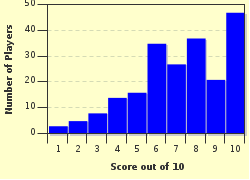Quiz Answer Key and Fun Facts
1. The word 'Utopia' comes from a 1516 book called "Of the Best State of a Republic, and of the New Island Utopia". The word itself combines two Greek words: 'not' and 'place' (though it also sounds like 'Eutopia', or 'good place'). Who wrote the book?
2. In this classic exploration of a Utopia from around 380 BC, Plato posits a society run by enlightened Philosopher-Kings in which there are no differences between the sexes (women fight alongside men) and in which useless disciplines like music and drama are abolished. What's the name of this cornerstone of philosophy?
3. James Hilton wrote about a Utopia in the Himalayas called 'Shangri-La', a delightful, peaceful place which slows down the aging process. What is the name of the 1933 novel in which Shangri-La appears?
4. The original Utopia was, of course, the Garden of Eden from the Bible, a paradise that had everything but a good snake-control company. Which of these is NOT a river in Eden, according to the Book of Genesis?
5. In "Gulliver's Travels", Jonathan Swift described several different lands that poor Lemuel got stranded in (he had the worst seafaring luck of anyone since Jonah). The last of Gulliver's travels was to the land of the Houynhnms, and it was quite Utopian. What animal do the Houynhnms resemble?
6. A 1975 book by Ernest Callenbach, describing the future year 1999 and a country which has broken from America to pursue the Utopian goals of clean food and water, no pollution, truth in advertising and marijuana use, has had a large impact on the Green movement in Western countries. What is its title?
7. "De Civitate Dei", or "City of God", was written in the early 5th century, and described two competing cities in allegorical terms--the City of God (whose citizens devote themselves to God and renounce earthly desires and pitfalls), and the City of Man (which is filled with sinners, agony and misery. Kind of like Jack Nicholson's "Chinatown"). Who wrote "City of God"?
8. Another Utopian place was described by Henry David Thoreau in an 1854 book. He spent two years living in a small cottage in the woods near a pond which has since become famous. What is the name of the pond (and the book)?
9. In 1872, Samuel Butler released a book dealing with a Utopia in which criminals are believed to be ill (and sick people are believed to be criminals), in which babies choose to be born, and in which machines have evolved intelligence. What is the clever name of this Utopia?
10. What is unique about the 1915 Utopia "Herland" by author Charlotte Perkins Gilman?
Source: Author
john_sunseri
This quiz was reviewed by FunTrivia editor
LadyCaitriona before going online.
Any errors found in FunTrivia content are routinely corrected through our feedback system.


